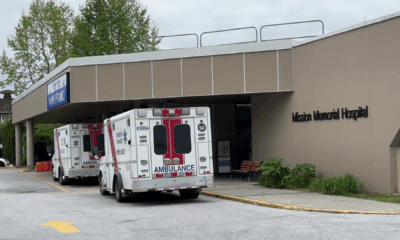Local News
B.C. health minister promises to look into medical waiting period for new residents

B.C.’s new health minister says her office will look at the possibility of removing the eligibility waiting period for the Medical Services Plan (MSP) for newcomers to the province.
Josie Osborne acknowledges that she’s just a few weeks into the job, but says her ministry will look further into the issue to understand the real impact of the policy.
“British Columbians told us loud and clear they expect us to continue to take action to strengthen our public health and mental health care system,” Osborne told 1130 NewsRadio.
“I can certainly commit to looking at that.”
B.C. is one of only two provinces that requires new residents to wait three months before they can be covered by the health-care system.
The policy has resulted in some high-profile and heartbreaking situations.
In April, the victim of a random stabbing near the White Rock pier found out he’d be on the hook for his own medical bills because he’d arrived in the country just days prior. When 1130 News Radio made inquiries, the ministry waived the three-month waiting period for that man.
Osborne says it’s difficult to hear stories like that of the White Rock stabbing victim and says she intends to do community outreach to hear more.
Dr. Shira Goldenberg, an associate professor at San Diego State University, formerly of UBC and SFU, who does research on the subject of the MSP waiting period, says it needs to be done away with entirely.
“It’s an incredible economic hardship that many families describe as, ‘We need to pick between putting food on the table or paying the bill,’” Goldenberg described.
“You’ll probably understand the peril that could put a family in who are simply sick or have had a medical emergency and need to be treated as human beings — just like all other residents of B.C.”
She says the “peril” of the waiting period disproportionately affects racialized groups, especially from Latin America, who fall through the cracks into what she calls an “economic catastrophe scenario.”
Once in that scenario, she says most patients will turn to online fundraising as their only recourse. Some community and migrant rights groups have made a difference in some cases, but Goldenberg says it shouldn’t be dealt with on an individual basis any longer.
“Our politicians, I think, need to prioritize this issue as part of their racial equity work if we really want to see inclusivity and meaningful attention to social justice in our communities. B.C. is one of the provinces in Canada that has the largest share of immigrants in its population, so it is extremely important to address this issue and to create longer-term systems that are more inclusive. And our community partners know well what those should look like and are very much ready and willing to work with the government on this when they’re willing to make it a priority.”
Goldenberg says the policy, which is designed to prevent medical tourism in B.C., actually worsens health outcomes and increases costs, because new residents are inclined to put off seeking medical attention until they’re covered, leaving conditions and illnesses to become worse and more expensive to treat.












